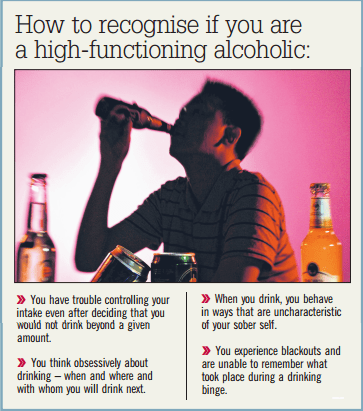Keeping Their Addiction Under Wraps

DURING the day, they are your model working professionals – the busy chief executive plotting his company’s course, the respected doctor tending to patients and the shrewd lawyer arguing cases.
But inside their heads, demons lurk. Unknown to their colleagues, they are already thinking of the evening’s alcohol fix. They lie to their spouses about their whereabouts after work, saying they are working late, when they are in fact drinking away at pubs and bars alone.
Psychiatrists and addiction specialists are worried about this group of “functional alcoholics” who are doing well at work and keep their addiction under wraps.
Inside, they are tortured – overpowered by the urge to drink, but keeping it at bay during work hours, inventing lies and terrified that they will be found out. Still, many do not seek help.
“They believe that since they can still fulfil their everyday responsibilities, they can’t possibly have an alcohol problem,” said Tan Hwee Sim, a specialist in psychiatry and a consultant at Raffles Counselling Centre.
“Unfortunately, family and friends often fail to see the signs as well. Their ability to function (helps) them to be in denial longer.”
There are tell-tale signs – like the senior executive whose shaky hands prevent him from signing documents at the office. He avoids coming in to work early and his urge for another drink makes him irritable. But he can function.
That’s not the point, said addictions specialist Munidasa Winslow. Just because they are functional does not mean they are “operating at an optimum level”, added Dr Winslow. Almost 60 to 80 per cent of his patients are functional alcoholics.
“They are usually pretty intelligent individuals, and may seek help when they realise that there are issues. But most want treatment to focus on controlling their intake rather than stopping,” he said.
Thomas Lee, medical director of the Resilienz Clinic, has observed a 20 to 25 per cent increase in the number of functional alcoholics over the past three years.
“I am seeing more and more cases of people who initially seek help for depression, anxiety or relationship problems, but the real underlying cause of these problems is their inappropriate alcohol use,” said Dr Lee.
These people can drink 10 shots of vodka or five jugs of beer at a sitting. But it is not the amount they drink that signals the addiction, but the effect of that drinking – like blacking out or forgetting the way home.
Stress at work plays a part, added Dr Lee. “They turn to alcohol as a way to relieve stress, numb bad feelings and to escape from real world problems,” he said.
Others work in sectors like banking and sales, where drinking is part and parcel of the job, said Calvin Fones, a consultant psychiatrist at Mount Elizabeth Novena Hospital.
“This complicates their recovery because when they want to stay dry, it is difficult for them to explain why they’re not drinking when they have to entertain clients,” he added. Over time, the work of the functional alcoholic could become inconsistent – good on occasion and missing deadlines on others, he said. “In alcohol dependence, the longer it stretches, the deeper they fall into the hole,” said Dr Fones.
As their addiction gets worse, they may even try to sneak in a drink during midday by storing alcohol in secret corners of cars or offices. Before they know it, they are not functional any more.
Source: My Paper ©Singapore Press Holdings Limited. Reproduced with permission.



